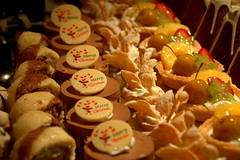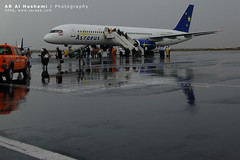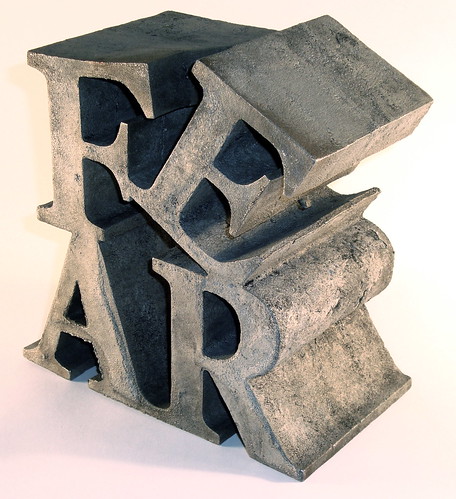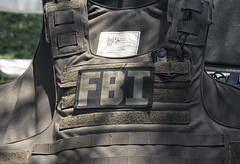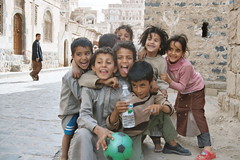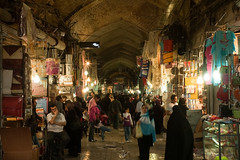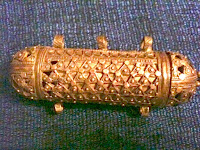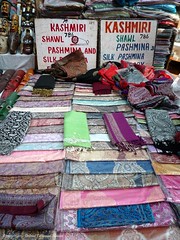 |
| Samira and Sumayya, two women at the Sanaa embassy |
One of my Arabic teachers at the Foreign Service Institute is married to Tim, an American who had joined the Foreign Service the year after I returned from Yemen. They had met when Nisreen was his teacher with the military before she joined State. Since they were both Arabic speakers, there was no doubt that they would be going to the middle east for Tim's first assignment. Since Nisreen is originally from Iraq and still has family there, that was the only middle eastern country Tim knew he wouldn't be sent to. In the end, he was assigned to Yemen. Tim and Nisreen offered me a place to stay while I re-explored Yemen.
One of the people I was hoping to see was Sumayya, my assistant for most of the time I was in Sanaa. Sumayya's parents were determined that she should marry. They had arranged her engagement before I arrived in Yemen, but by the time I arrived, she had broken it off, insisting to her parents that she was not yet ready to get married. Then toward the end of my year in Sanaa, they pressured her again, saying that they wanted her to stop working as they felt her involvement with the embassy was distracting her from focusing on getting married. We had a party for her on her last day in the office, but as she was leaving she told me not to worry because she had no plans to get married and she was certain she would make her parents regret that they had forced her to quit her job. She planned to be back at the embassy in a short time.
 |
| Sandra and Sumayya at Sumayya's farewell party |
After she stopped working at the embassy, I continued to see Sumayya as she and others invited me to join them in their homes where they could relax and not have to be constrained by abayas and hijab coverings. One of the most interesting women I met through Sumayya was originally from Aden. I didn't get to know her well, but I was struck by the fact that when her mother called her, the two of them spoke together in English, not Arabic. From 1937 until 1963, Aden and the immediate surroundings were a British Crown Colony. Even before 1937, Aden was under British rule, but administered as part of British India. The British presence ended in 1967 when the Federation of South Arabia became the People's Republic of South Yemen. In spite of the fact that 35 years had passed since the British left Aden, its influence was still evident.
Sumayya got in touch with me as soon as I arrived in Sanaa. Since it was very rare for Yemeni women to drive, Sumayya had arranged for a car and driver to take us out of Sanaa, to the village of Thula, where the young children seem to speak all the languages spoken by tourists who arrive there. I had been there several times during my year in Sanaa. What was on offer at the Thula souq was no more interesting than what was on offer in Sanaa, but just watching the children as they interacted with visitors was worth a return trip. In many cases, the shops themselves seemed to be totally in the care of the children. The boys in particular learned quickly how to strike a good bargain.
At the time of my quick trip to Yemen, Thula was out-of-bounds for embassy staff, but Sumayya was certain she and I would have no problem getting around, especially since we had a male driver with us. And I knew I had my guardian angel, so we headed out for the adventure. I couldn't just look without succumbing to at least one purchase. After negotiating and then rejecting the best price on several items, I ended buying a bundled string of extremely small beads the seller said were coral. He also assured me I would not see anything like it in any of the shops in Sanaa. He was right. The coral beads were actually clay, worth much less than that best price I settled on.
 |
| Typical wall of jewelry in the Sanaa souq |
Nisreen invited many of the staff of the embassy for a party after work on the Friday. I still feel guilty for all the work she put into that evening, with nowhere near the help she should have gotten from her guest. Many of the people who came were interested to meet me since they couldn't imagine that there was a person on earth who would choose to come back to Yemen after having gotten out. Life in Sanaa was much more constrained than it had been when I was there.
And since then, life has become even more constrained. All the staff now live in a hotel near the embassy compound. They are driven to and from work in embassy vehicles. There is no more exploring the streets, varying the route on whim or caprice or dancing with cars on the roads.
I am so very glad I had the opportunity to spend a year in Yemen in what were clearly the good old days.
